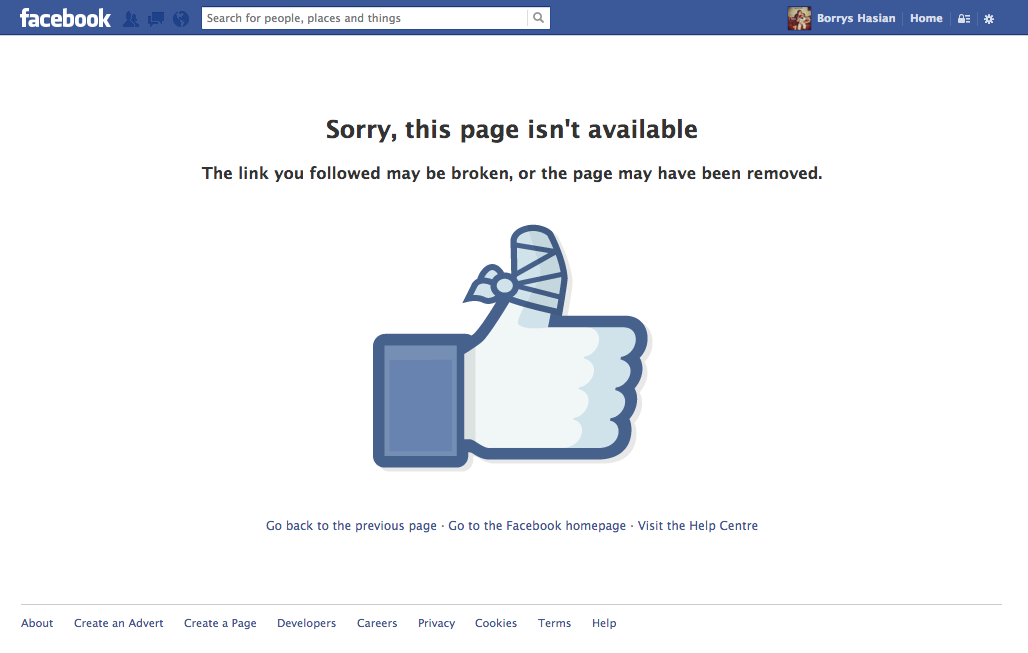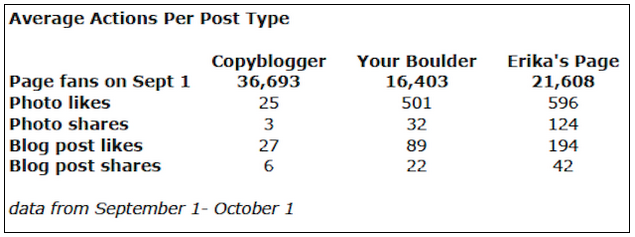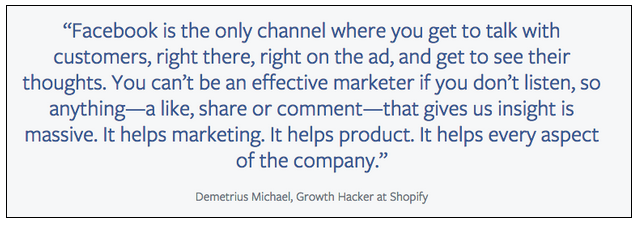I’ve personally been using Facebook since it’s inception. And like any long-term relationship it’s had its ups and downs.
There has been lots of love: engaging content, surprising updates, discovering new businesses, and so many amazing photos.
There has also been a lot of hate: requests to play Candy Crush, updates from people I don’t really care to hear about but have to be friends with and those regretful updates I made during my night on the town.
As an individual, there’s no denying it, Facebook is the ultimate social source for sharing information and staying connected with the world. And up to this point (though it could happen) no one has done it better than Facebook.
The story changes as you move from the individual to the business using Facebook. Now, instead of absorbing content, you’re finding content to leverage to your Fans in hopes they’ll become a customer. But how do you have a voice in the midst of many (many!) businesses vying for limited space on the News Feed?
You really need to evaluate, is being on Facebook the best use of your resources?
In the past year there’s been some outcry from several businesses who’ve publically removed themselves from Facebook.
In this article I’m going to evaluate three businesses that have left the Facebook platform and three that have stuck around and had success. Through a clinical analysis we’ll (together) gain some understanding of the motivations behind each side of this controversial story.
Some Context
Organic reach (the number of Facebook users your business can reach for free) on Facebook has hit an all time low. They’ve had to restructure their algorithm to display content from friends and businesses that people actually want to see. Why did they do this?
With so much content being shared, across multiple devices and by billions of people, it’s hard to remain competitive and be heard. Do you really expect someone to hear you from across the room at a packed concert? It’s the same with Facebook except way, way larger, with way more bands and more people than all the concerts that’ve happened in the past year.
The algorithm is working and people like it. If Facebook just pumped out the thousands upon thousands of updates from business Pages and friends alike the platform would essentially be Twitter – and we already have that. They’ve created an algorithm that works for its users.
3 Companies Who said, “I’m Out!” to Facebook
On the face of it, Groove, Copyblogger and Eat24 don’t have a lot in common. Groove sells help desk software, Copyblogger sells copywriting resources and Eat24 is kind of like an online food bible.
What brings them together, however, is that they are all very successful businesses who have left Facebook within the past year. In this section i’ll be sharing with you why leaving Facebook was the best option for them and what they’re doing instead.

Groove announces they’ve left Facebook: Read the full report here
Why leaving Facebook was the right choice for Groove:
-
Low engagement on their Facebook page: After setting up their Facebook Page they only had 200 Likes and were receiving minimal engagement with the content they were posting.
-
They didn’t have time to dedicate to Facebook: They spent about an hour per week maintaining their Facebook account.
What they’re doing instead:
Generating leads from their blog.
Groove has 20,000 blog subscribers and receives high levels of engagement directly on their blog. Since this is their primary source of customer acquisition and since their team is remote and small, dedicating their time to the resources that are making them money makes the most sense.
Copyblogger announces they’ve left Facebook: Read the full report here
Why leaving Facebook was the right choice for Copyblogger:
The rationale behind Copyblogger leaving Facebook was that its audience is elsewhere. They felt that if their audience wasn’t engaging on Facebook anyways then what was the point of pouring energy into it? They used the following chart to back up their claims to leave Facebook and added, “despite good intentions, best practices, and having a slew of fans, Facebook might not be the best place to invest brand time and energy.”
The table below shows three businesses that use Facebook for business in comparison: Copyblogger, Your Boulder and Erika’s (the girl who was running this comparative analysis) Pages. The table was meant to reinforce that other businesses can do well on Facebook (Your Boulder and Erika’s Page) but Copyblogger simply isn’t.

What they’re doing instead:
Going where their audience is: Google+ and Twitter.
Copyblogger has found they get more way more engagement in terms of social shares and comments on both Google+ and Twitter. Instead of investing their time between three social networks they’re now just focusing on the two that are working best for them.
Eat24 announces they’ve left Facebook: Read the full report here
I found both the initial letter to Facebook from Eat24 and the response from Facebook so interesting (and valid from both sides) that I’ve re-published what I see as the most pivotal parts from each side to provide you with some context.
Here is an excerpt from Eat24 to give you a taste of what they wrote to Facebook:

Facebook responded as follows:

Why leaving Facebook was the right choice for Eat24:
Eat24 was an early adopter of Facebook and as such they were initially able to leverage high amounts of organic engagement from their posts. Their rate of engagement decreased as competition for prime News Feed space increased. As such they spent 1 million dollars on Facebook without seeing the results they used to get organically. They felt “enough is enough” and left Facebook publicly.
What they’re doing instead:
Email marketing.
After closing their Facebook Page, Eat24’s weekly email open rate went up. While their Facebook Page was running, the average open rate was hovering at 20%; after closing it and devoting more time, energy and resources to email, they started seeing over 40%.
Key takeaway for anyone looking to remove their business from Facebook:
*You need to be responsible to your audience. * If you don’t have the time or resources to manage your Facebook Page, there’s little point in having one. You need to be constantly updating, targeting your audience and looking at what is working and pulling the plug on what is not.
3 Companies Who’ve said, “I’m sticking with you Facebook”
Full disclosure, these three companies’ stories on Facebook were posted and written by Facebook. That said, don’t let the source of these stories discount the massive gains these companies have had using Facebook as a marketing tool. I’m going to link to both the success story posted by Facebook and to the business’ Facebook Page so you can see the results for yourself.
Sweethaus Bakery, a brick and mortar store finds success on Facebook sharing some sweet deals

What success has Sweethaus Bakery had on Facebook?
Looking at their Facebook Page you can immediately see the high levels of engagement with on average 20 Likes per post. Their greatest success, however, has been in their social offers (online coupons) that customers can claim in-store. Over 1,000 social offers had been claimed at the time of publishing with a 12% redemption rate.
Why they’ve found success on Facebook:
They shared timely and relevant social offers that people ate up.
They built brand awareness of their product by sharing photos of their treats and drove in-store sales through gifting social offers at the right time. How could people resist?
Tilt finds success on Facebook by driving traffic to an optimized landing page

What success has Tilt had on Facebook:
Tilt had a 70% boost in website traffic to a designated landing page.
Why they’ve found success on Facebook:
They ran highly targeted ads, increasing their click-through-rate by 9% over untargeted ads. This in turn boosted traffic to a highly relevant landing page which boosted their conversions.
Shopify dropped their cost-per-lead (10-fold) and expanded globally using Facebook

What success has Shopify had on Facebook: They increased their reach to over 150 countries while at the same time dropping their cost-per-lead by 50%.
Why they’ve found success on Facebook: Facebook allows them to track and measure the success of their ads. Facebook makes it easy for them to target their ads by using Website Custom Audiences.
Lessons learned from businesses who have used Facebook to successfully market themselves:
Success on Facebook happens, all of the time. But like with any successful relationship you need to put the time and effort into it to make it work. People, technology and the world are constantly changing around us. Facebook needs to keep up by constantly changing, and that means as a business you have to as well.
You can use Facebook to achieve your marketing goals so long as you have a goal in mind and passion to succeed. If one post doesn’t get a lot of engagement or you create an ad and your click-through-rate is atrocious don’t blame the messenger. There is tons of helpful information out there to get your business in front of the right customers.
If you’re curious about how to find success on Facebook, check out these related articles:
- 17 Experts Tips On Dealing with The Latest Facebook Algorithm Changes
- 10 Things Facebook Fans Crave From Your Business Page
- 5 Content Tips For Your Facebook Business Page
In summation
I can see valid points on both sides of the Facebook fence. To Facebook Page or not to Facebook Page? I genuinely do feel that you can find success as a business on Facebook but whether there is space for you on this medium or not is the question.
Do you have a Facebook Page for your business? What are some things you’ve done with your Facebook Page that have given you results?

